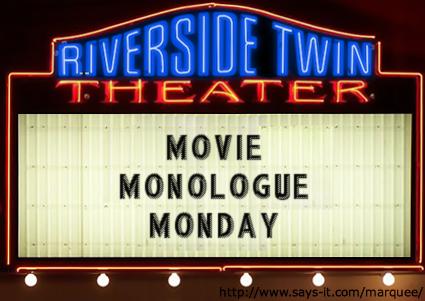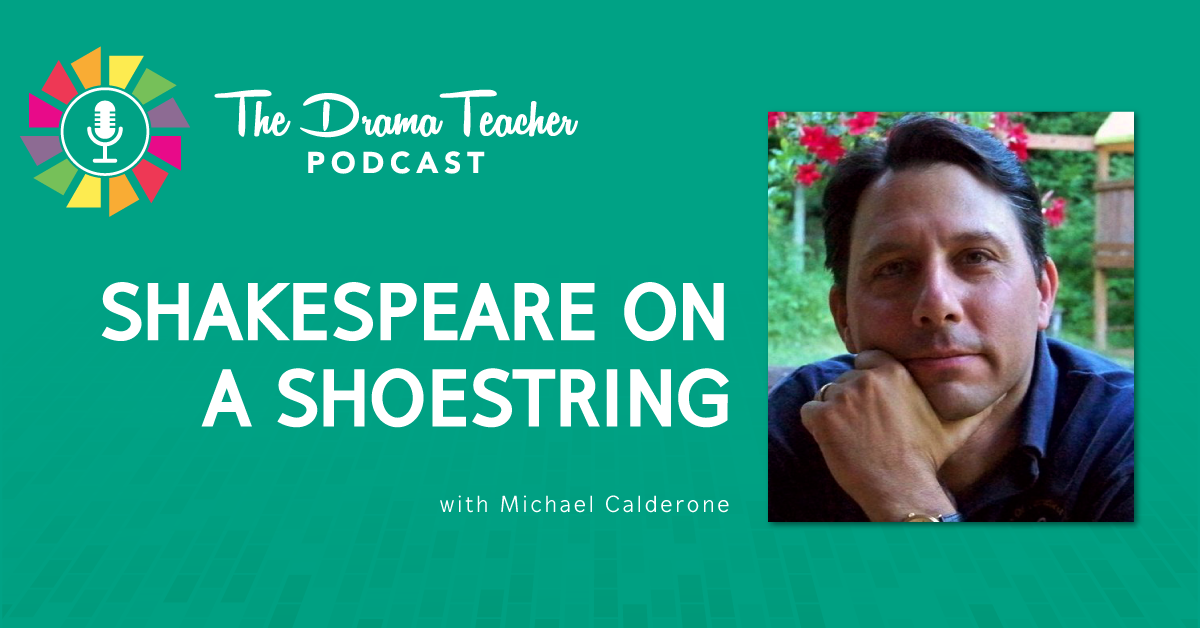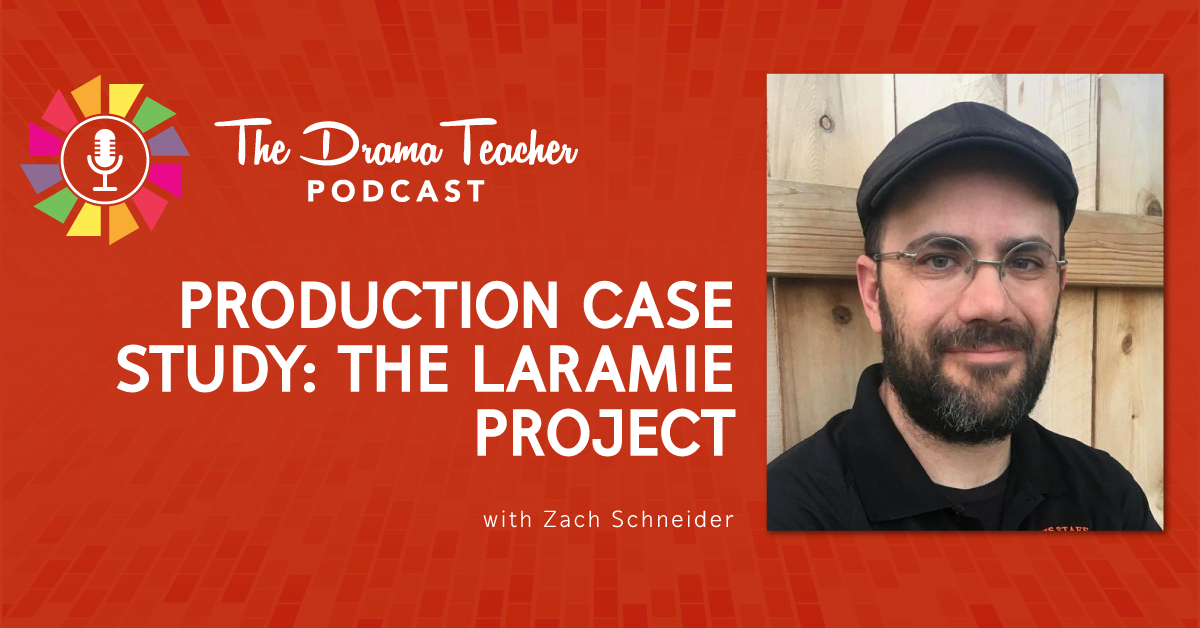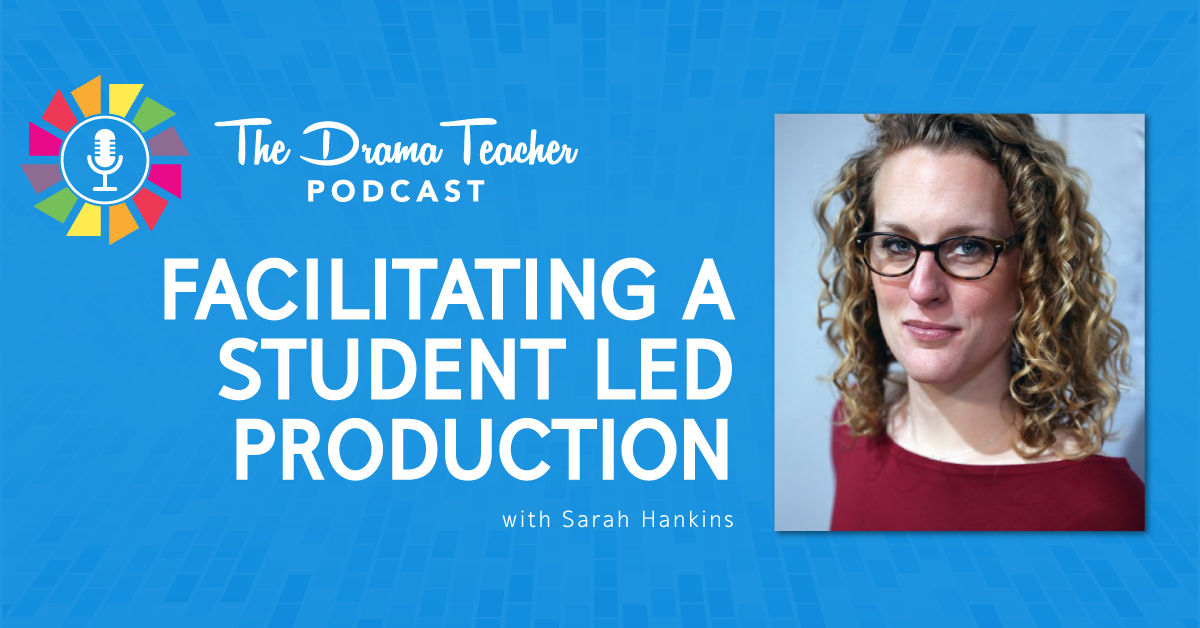Movie Monologues
Episode 28: Movie Monologues
Craig and Lindsay talk about a new series on the Theatrefolk Blog – Movie Monologue Monday. What can an actor learn from a movie monologue and why is it a bad thing for actors to audition with a movie monologue?
Show Notes
Movie Monologue Monday Blog Posts
Subscribe to The Theatrefolk Podcast
Episode Transcript
Lindsay: Welcome to TFP, The Theatrefolk Podcast. I’m Lindsay Price, resident playwright for Theatrefolk. Hello. I hope you’re well. Thanks for listening.
Today, Craig and I are going to talk movie monologues. What can you learn as an actor from a movie monologue? But first, let’s do some Theatrefolk news.
Okay, so really, the news part is the fact that we have this great new series on our blog, Movie Monologue Monday, which, guess what? I’m going to talk about it in two seconds with Craig, so let’s get to it. Let’s get right to the heart of the matter.
But before I forget, where, oh where can you find this podcast? We post new episodes every Wednesday at Theatrefolk.com and on our Facebook page and on Twitter. You can find us on the Stitcher app, and you can subscribe to TFP on iTunes. All you have to do is search on the word “Theatrefolk.”
So, on our blog, Craig has recently started a series called Movie Monologue Monday, where he talks about a specific movie monologue and provides a YouTube clip of said monologue. We don’t often think of the movie monologue because movies are so often go, go, go, go action, but there are actually a lot of really amazing moments.
I think of the Alec Baldwin monologue from the movie version of Glengarry Glenn Ross. In fact, I always quote his big line, is, “Always be closing,” and in my head I say that at least once a—okay. I was going to say once a month, but then I’m like, no, I say it more than that. And then my favorite movie monologue isn’t even in its movie. It’s from Waiting for Guffman, and it’s only found in the DVD extras.
So I started to ask Craig about this series and why he started it, and we got to talking, and I thought, “We should be recording this. This is actually something that we could do do for a podcast.” So, hi Craig.
Craig: Hi Lindsay.
Lindsay: Okay. So, my first question to you is, why did you start a series called Movie Monologue Monday?
Craig: Well, I follow a podcast called The Film Vault. I’m actually not even much of a film buff. I just like listening to the two guys that are on the podcast. And they talk about movies and each week there’s a theme, and a few weeks ago their episode was on the topic of movie monologues.
So I thought, “Oh, this is a good one.” I thought I was just going to link to it for our blog, but I thought, “Well, maybe if I can find some of the YouTube clips of those monologues, I’ll post them.” And then I thought, “Well, why don’t I just look at one and write about it and just post that?” And then I thought, “Oh, there must be a million movie monologues out there,” and I knew a few off the top of my head that were really important to me, and so I put it out there on our Facebook page just asking people for some input on what their favorite movie monologues were.
And so I just started doing one, and then I thought, “Well, why not make a little series of this?” So that’s what I do every Monday. I analyze one movie monologue.
Lindsay: I’ve been finding it pretty fascinating. What are some of the ones you’ve done so far?
Craig: I started with my all-time favorite, which is Robert Shaw’s speech in Jaws about the USS Indianapolis, the shark attack.
Lindsay: Yes.
Craig: I’ve done Charlie Chaplin’s speech from The Great Dictator.
Lindsay: And then this one, this past…not this past week, but right after the Super Bowl you did one I’d never heard of, mostly because I’m assuming I don’t watch football movies, but it was Al Pacino from Any Given Sunday.
Craig: Yeah, and actually I have never seen that movie. That just came from a tip on the Facebook page. So I looked it up and boy, it’s a fantastic speech.
Lindsay: And you know, what I really like about it is that it’s well-written. Now, there are a lot of other things going on, which we can get into about what are the differences between theatrical monologue and a movie monologue, and to me one of the differences for the movie monologue is really the external elements that always get added, a lot of it music, cutaway shots. And in your blog post about the Any Given Sunday one, you were talking about how you don’t like it when music sort of influences how you’re supposed to feel.
Craig: How I feel. Mm-hmm.
Lindsay: But for this one, the cuts that they showed, and sometimes it was a very interesting technique where the monologue kept going so we heard the oral when we saw different pictures, and it was the energy of the crowd, the energy of the football players that carried to the climax.
Craig: Yeah, and that one’s interesting too, because when I first watched it I thought I was going to start complaining about the music because I can’t stand music in film, because I just think it’s—let me put it this way. I think it’s used too much. I think it’s used to tell me what I’m supposed to think. It’s a cheap copout. I would rather just see the story told well. I mean, and if music can enhance that, that’s fine, but I find that the wall-to-wall music that we see in most movies now just tries to impose too much on what I believe.
Anyhow, but about the music in that particular scene, when the music started right at the beginning I thought, “Oh great, this is going to get really annoying.” But the music’s actually used very effectively. It’s very soft. It’s a driving but slow pace that actually doesn’t try and mimic the emotion of the speech. It just tries to… I think it just supports the momentum of what he’s talking about.
Lindsay: Right. What can we learn from, like what can an actor…because that happens all the time, right? We see young actors, and a lot of times when they’re looking for a monologue to do, they do turn sometimes to the movie monologues even though, particularly if they’re auditioning for a show or something, it’s like, oh, that’s supposed to be verboten. But what can we learn? What can a young actor learn from a movie monologue?
Craig: Okay, well, I think there’s a lot you can learn from a monologue, but I think, let me go back to, I’ll say that I’m never convinced it’s a great idea to do a movie monologue for an audition.
Lindsay: Why?
Craig: Because the same reason that you shouldn’t do Memory from Cats. It takes the auditioner outside of what you’re doing because they have heard that song so many times by such iconic performers that they cannot help but compare your performance to Betty Buckley’s. Is that the right name?
Lindsay: Yeah, Betty Buckley. So what you’re saying is that you’re not helping yourself.
Craig: No. I think if you’re going to do like the monologue from Any Given Sunday, I mean, you’re instantly putting yourself up against Al Pacino, and I don’t think that’s a great…
Lindsay: That doesn’t help you.
Craig: Not too many people are going to do well in that matchup. But, that said, I think there’s a lot you can learn as an actor from watching a movie monologue. I don’t think you can learn a lot as an actor about acting for movies in general because so much of the work in film comes from the editor, comes from the director, comes from the director of photography. Not to take anything away from actors, I mean there’s a lot of craft going on, but it’s hard to see it sometimes because it’s disguised by the rest of the team. Whereas in theatre, it’s very much an actor’s medium. You can see what the actors are doing and it’s an immediate experience.
So what I think is great about a good movie monologue, the ones that I’ve been posting, is that you can actually see the craft of the actor, because I tend to not pick the ones that, like I say, are supported by music or supported by a lot of visual cuts. So I think it’s a really great way to really have a great look at what an actor is doing.
And what you can do with a movie monologue that you can’t do with a theatrical monologue is you can rewind. You can go back. You can look at the same moment over and over again and see how the actor is adjusting the performance. You can see how the performance is changing from the beginning to the end. You can note how at emotional climaxes the actor is not necessarily yelling or out of control. You can trace those things that you can’t quite do when you watch a play.
Lindsay: It might be a really great analysis exercise, you know, in a class, where you’re just going, “Okay, here’s this monologue. You must watch this monologue 10 times. What did you notice the first time you watched it? What did you notice the tenth time you watched it? Watch it this time, and now focus on don’t watch, only listen. Okay, now this one, turn off the sound, and what do you see? What is happening with the actor physically? And what does it tell you about what he’s saying when you can’t hear the words?
Craig: Mm-hmm. Yeah, I don’t know if I suggested this one yet, but I was thinking of, for one of the monologues, I was actually going to—maybe it put it in, I don’t recall—I was going to do an exercise where you can graph out over time the intensity of the actor’s performance because, I can’t remember which one it was, but it was such a well-measured up and down that the actor was taking that I thought that that would be a good exercise too, so that you could graph out the emotional intensity too.
Lindsay: Mm-hmm.
Craig: To show that there is a journey. It’s so often you see students do monologues, they’re all at one note.
Lindsay: Mm-hmm.
Craig: If their character is going to be angry at the end of the piece, they start angry and play that one emotion through. Or, if they’re angry at the beginning and they’re angry at the end, they start off so angry at the beginning that there’s no room for them to…
Lindsay: Grow.
Craig: To grow, to get bigger.
Lindsay: Which is…
Craig: And, sorry…
Lindsay: No, no, you go…
Craig: And in film, you can’t just start screaming because the camera is so in your face. I mean, the best film actors, if you really watch them, they’re not doing anything. When you do anything on film, it looks like you’re doing something crazy. So to see an emotional monologue delivered with such stillness—and I know one that I did, too. I thought of the Charlie Chaplin monologue from The Great Dictator. I think one of the exercises I put in there was to put a piece of masking tape, freeze it at the beginning and put a piece of masking tape on either side of his head, and watch how that head does not move throughout the piece no matter how tightly framed the shot is.
Lindsay: That’s pretty awesome.
Craig: Yeah.
Lindsay: I love that. Well, and then you just…
Craig: And he’s playing Hitler at a rally.
Lindsay: And just think about too, okay, Robert Shaw is talking about an entire shipload of men who he has to listen to basically get eaten by…
Craig: Sharks.
Lindsay: …sharks, you know? And how he’s not…oh, because this is something, it happens all the time in theatre that we mistake emotion with loudness and with crying and with…
Craig: Mm-hmm.
Lindsay: There’s this whole notion in the theatre—no, given, it’s a different medium, you are working in…you have to reach a larger audience. Absolutely, absolutely. But it is so easy to mistake emotional with largeness.
Craig: Oh, I think I pointed this one out, too, at the Shaw one, Robert Shaw’s speech, I believe he laughs at the beginning of the speech and towards the end. Laughs.
Lindsay: Yeah.
Craig: This is a speech where—he’s describing a horrific event that he lived through and witnessed, and he laughs. That’s playing the opposite, right?
Lindsay: Yeah.
Craig: What’s the opposite of horror? Laughter.
Lindsay: Yeah. And that’s my absolute favorite. One of my absolute favorite theatrical techniques is playing the opposite, to do something that you’re not supposed to do.
Craig: Mm-hmm.
Lindsay: And which, again, we roll back to, “Oh, my character would never do that,” and it’s like, of course your character would do that.
Craig: They do it right here on page 33.
Lindsay: That’s, A, they do it right here on page 33, but also, we do unexpected things all the time, and what’s a more wonderful, juicy experience than to watch somebody laugh when they’re just about to describe something horrible.
Craig: Mm-hmm.
Lindsay: And I also think about that Any Given Sunday one, because he is trying to…he’s a coach, right?
Craig: Mm-hmm.
Lindsay: And I think…aren’t they’re in a horrible hole…
Craig: I think they’re down badly at halftime, yeah.
Lindsay: And he basically is trying to pump them up to go and win the game, and you know, I think about, because we watch football, and I think about all the locker room things they show, and there’s like, “Rah!” and you know, the coaches are like, “Come on, let’s go!” Well, you can’t do that in a movie.You can’t be that large, which is so funny to think about because that’s all movies are, is these explosions and big music and bigness, but…
Craig: Mm-hmm.
Lindsay: …the notion of bigness and acting doesn’t compute.
Craig: Acting and film is very small.
Lindsay: Okay, so there you go. So that is something to take away with. If you are an actor and you’re just starting out, if you want to look at movie monologues, really look at how they handle emotion and how they handle their medium, and how they don’t mistake emotion with overacting.
Craig: Yes, and if you have a favorite movie monologue, then please get in touch. You can leave a comment wherever you happen to see this podcast posted or just send us an email through the contact page on our website, and I’d love to have a look. Particularly, not a lot of monologues by women. I don’t know if that’s just my own research is not good or if there aren’t as many great monologues for women, great writing for women in film, but like I have a few that I’ll—actually, I should do a woman next week, shouldn’t I?
Lindsay: Yes, absolutely. You’ve heard it here, now get out there and send us your movie monologues. Okay, that’s it, that’s all. Take care, my friends. Take care.
Music credit: “Ave” by Alex (feat. Morusque) is licensed under a Creative Commons license.



